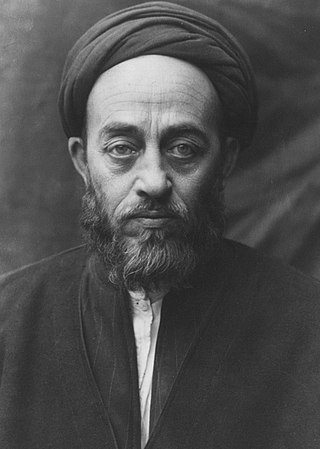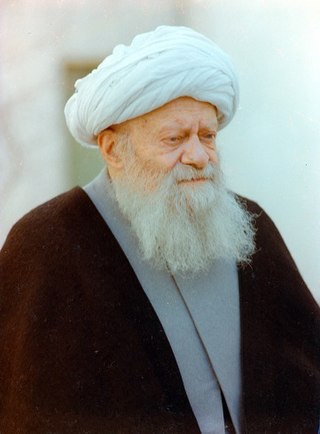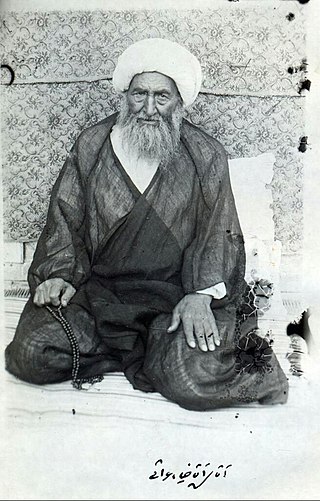
Muhammad Husayn Tabataba'i or Sayyid Mohammad Hossein Tabataba'i was an Iranian scholar, theorist, philosopher and one of the most prominent thinkers of modern Shia Islam. He is perhaps best known for his Tafsir al-Mizan, a twenty-seven-volume work of tafsir, which he produced between 1954 and 1972. He is commonly known as Allameh Tabataba'i and the Allameh Tabataba'i University in Tehran is named after him.

Grand Ayatollah Sayyid Muhammad-Sadiq Husayni Rohani was an Iranian Shia marja'.

Grand Ayatollah Mohammad-Taqi Bahjat Foumani was an Iranian Twelver Shia Marja'.

Grand Ayatollah Sheikh Hossein Wahid Khorasani is an Iranian author and Shia marja'.

Grand Ayatollah Mohammad-Reza Golpaygani was an Iranian Shia Muslim and marja' scholar and was born in 1899 in Gogad village near the city of Golpaygan, Iran. He was taught preliminary studies by his father, Mohammad Bagher. At the age of 9, his father died, and he moved to Golpaygan to continue his studies. He was one of the highest-ranking Islamic clergies to participate in the Islamic Revolution of 1979, and a one-time serious contender to succeed Ruhollah Khomeini in the 1989 Iranian Supreme Leader election. However, his candidacy was voted down by the Assembly of Experts, in favor of the eventual successor, Ali Khamenei.

Ayatollah Mirza Hashem Amoli Larijani was an Iranian Shia Marja' and scholar of jurisprudence.

Ali Qazi Tabatabai, also known as "Allamah Qadi" and "Ayatollah Qazi", was an Iranian alim and mystic. He was the son of Husseyn and was born in Tabriz, Iran. He was born on 29 April 1866 in Tabriz. His father Sayyed Hosein Qazi was a prominent pupil of the grand Mirza Shirazi. His maternal grandfather, Mirza Mohsen, was a great jurist.

Seyyed Nematollah Jazayeri was a prominent Shia scholar born in 1640 and died in 1700, in one of the islands around Basra. He was one of the grandchildren of Musa al-Kadhim. His paternal lineage is as follows: Seyyed Ne'mat Allah son of Seyyed Abd Allah son of Mohammad son of Hossein son of Ahmad son of Mahmoud son of Ghias Aldin son of Majd Aldin son of Noor Aldin son of Saad Allah son of Issa son of Musa son of Abdallah son of Musa al-Kadhim.

Mohammad Taqi Amoli (1887—1971) was an Iranian Shia jurist, philosopher and mystic.

Mirza Mahdi Ashtiani (1888–1952), a man of wisdom, mystic, man of literature, was a Great Master in the philosophical School of Tehran.
Sayyed Abul Hasan Rafiee Qazvini was an Iranian philosopher and jurist.

Mirza Mahdi Elahi Qomshehei was an Iranian mystic, poet, translator of the Quran, and one of the grand Masters of the philosophical school of Tehran.
Ayatollah Hajj Muhammad Ali Hakim Movahhed Namazi Shirazi was an Iranian mystic. He was noted as one of the masters of the philosophical schools of Tehran.

Ayatollah Hajj Sheykh Hasan Ali Nejabat Shirazi (1917-1989) was an Iranian mystic, author of several published theological works, and political activist.
Al-Sayyid Moḥammad Mehdī Baḥr al-ʿUlūm or Bahrululoom (Arabic: السید محمد مهدی بحرالعلوم) was a mystic and a Shiite religious authority in the 12th and 13th centuries AH.

Hassan Hassanzadeh Amoli was an Iranian Shi'ite theologian known for his mystical tendencies and Islamic philosophy. He was among clerics who overcomed the traditional opposition to teaching philosophy courses at Shi'ite seminaries. He wrote many books in philosophy, mysticism, mathematics, astronomy, Persian and Arabic literature.He interpreted the Islamic philosophical tradition in a similar way to Mulla Sadra, which is a reconciliation of religion, reason and mysticism. His books include Sharh fusus al-hikam, Tashih nahj al-balagha, Insan dar 'urf-i 'irfan, Tashih kalila wa dimna.

Zia'eddin Araghi also known as Agha Zia'eddin Araghi was an eminent Shia jurist, Usuli and Mujtahid during the flourishing the Usul Fiqh in Ja'fari school in Shia after Muhammad Baqir Behbahani.
Sayyed Muhammad Tabatabei Fesharaki was an eminent shia jurist in 13th Lunar Hijrah. He was considered as Master of eminent religious scholars such as Muhammad Hosein Na'ini and Abdul-Karim Ha'eri Yazdi, the founder of Qom Seminary.

Seyed Mahdi Hosseini Rohani Persian: سید مهدی حسینی روحانی was an Iranian Ayatollah born in Qom. He served in the First, Second, and Third terms of the Assembly of Experts.














